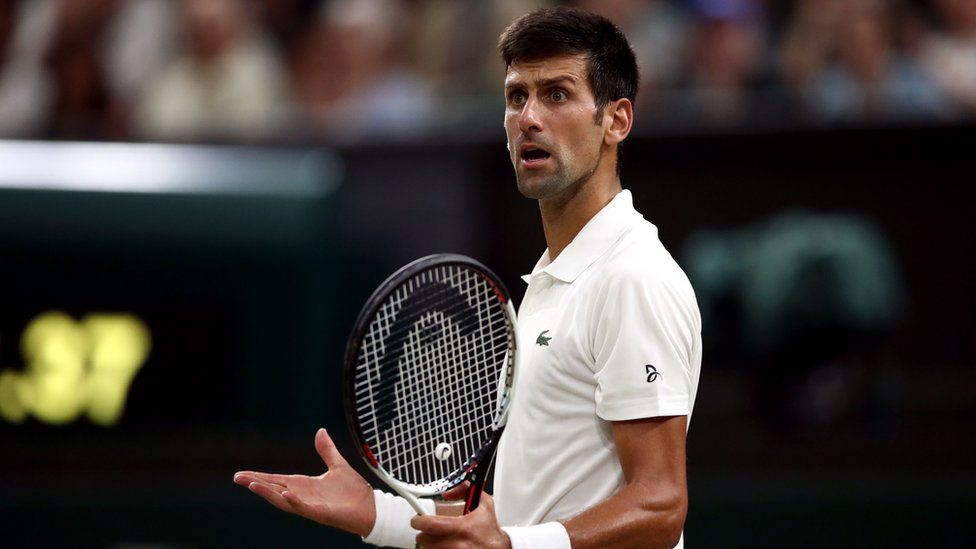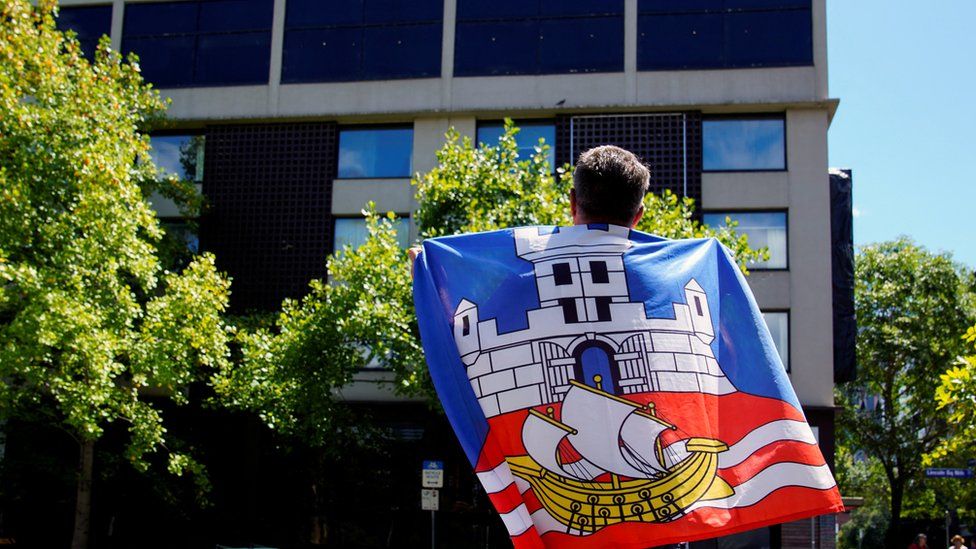
When Novak Djokovic announced earlier this week that he'd playing in the Australian Open with a vaccine exemption, it sparked a furious reaction among locals.
Now the world's number one male player has found himself detained in an Australian immigration hotel fighting deportation.
What was meant to be the start to another Grand Slam campaign has escalated into a diplomatic storm. Here's how it's played out so far:
How was Djokovic allowed to enter Australia?
News that Djokovic had been approved to play in the Australian Open, which begins 17 January, was revealed by the player himself on Tuesday.
Australia requires all foreign visitors entering the country to be double vaccinated. Otherwise, they need to complete 14 days in quarantine.
But Djokovic, who is not believed to be vaccinated, said on social media he had gained a medical exemption to play in the Grand Slam.
Tennis Australia - the sporting body which runs the Australian Open - confirmed the top seed had gained entry under its "exemptions" policy. It said in total 26 athletes had applied and "a handful" had been successful.
This is how the policy works: two independent medical panels assess claims from players - which are anonymised to prevent bias.
Valid reasons for exemptions include an acute medical condition - such as an inflammatory cardiac illness. A Covid infection in the past six months also counted under the Tennis Australia policy.
The policy was announced in December, and endorsed by the Victorian state government. Federal authorities back then had no objection to the policy.
What was Australia's reaction?
But that changed after the public learnt about Djokovic's approved exemption. Many Australians were angered by the decision to grant him entry..
Djokovic has been a polarising figure during the pandemic. He has previously expressed anti-vaccination sentiments. In the first year of the pandemic, he also staged a commercial tennis tour where he and other tennis players contracted Covid. He later apologised for putting people at risk.
In Australia meanwhile, locals have lived through months of lockdown and restrictions. Most have followed government directions to get vaccinated - over 90% of the adult population is double-dosed.
But the country is also in the depths of its worst Covid wave yet - with over 70,000 new cases reported on Thursday. This is placing immense strain on hospitals and businesses. Public anxiety is high.
Initially, Prime Minister Scott Morrison had said he accepted the Victorian state government's decision to grant Djokovic and other tennis players medical exemptions.
He said on Tuesday that federal authorities - who control the borders - would "act in accordance" with the state's decision as "that's how it works".
"States provide exemptions for people to enter… that's been happening for the last two years," he said.
But amid the public outrage, by Wednesday he had backflipped. Mr Morrison warned that Djokovic would be sent home if he failed to provide proper medical proof.
Why was Djokovic turned away at the airport?
On Wednesday night about 23:30 local time (12:30 GMT), Djokovic landed in Australia at Melbourne Airport. He was promptly assessed and rejected. His visa was cancelled on the spot and he was taken into temporary immigration detention.
The tennis player had failed to provide evidence he was double vaccinated, or had a legitimate exemption to that, Mr Morrison explained at a press conference the following morning.
"He was unable to furnish that proof to Border Force officers at the airport last night and they are the rules and it happens on many occasions and that is what has now happened," he said.
Australian media reported the rest of Djokovic's team was allowed to enter Australia because their vaccination status was approved.
Djokovic was taken away by Australian Border Force officials to an immigration holding hotel, where he is now awaiting a decision on his fate.
It's clear that Australia's federal government has overruled Victoria state in this case. Australia is a federation but its constitution allocates border control to Canberra, not state authorities.
While Tennis Australia had granted Djokovic approval under a policy endorsed by Victoria state, the same policy hadn't been approved by Canberra.
On Thursday, Mr Morrison said the Australian Border Force had sent letters to Tennis Australia back in November outlining federal conditions for vaccinated entry. He said a recent Covid infection (or one in the past six months) was not a valid reason.
He also said it wasn't uncommon for people be turned away upon landing in Australia, because immigration officials assess visa compliance upon arrival rather than prior to entry.

But one former border force commissioner wrote that the blame couldn't be placed on the state authorities alone, as federal officers would have signed off on the initial granting of the visa.
And as Mr Morrison noted himself on Tuesday, throughout the pandemic, states have been given the power to grant entry to foreigners without a veto from Canberra.
That's all led to speculation by most Canberra observers that Djokovic's ban is largely politically motivated.
Mr Morrison is facing an election in a few months time. He has been under intense criticism due to rapid Omicron spread in the country and Djokovic was an easy scapegoat, commentators say.
Where does this leave Djokovic?
Djokovic's camp is furious about the sudden about-turn, and say he's being made an example of. Plus, there are three other unknown tennis players with exemptions who have been let into the country, Australian media reported.
Djokovic launched an appeal against his visa cancellation immediately after he was held. He's launched a court bid for an injunction to stop his deportation - so he can stay in the country at least.
That hearing has been deferred to Monday, so the tennis star may have to spend the weekend in immigration detention.
He is free to leave the country. Some commentators say he could fly out of Australia to pursue his court case from another country, or reapply for entry.
Meanwhile Serbia has rallied round their national champion, with President Aleksander Vucic accusing Australian authorities of "harassing" Djokovic. Canberra has denied that claim.
Reporting by the BBC's Frances Mao
This video can not be played
To play this video you need to enable JavaScript in your browser.
https://news.google.com/__i/rss/rd/articles/CBMiM2h0dHBzOi8vd3d3LmJiYy5jby51ay9uZXdzL3dvcmxkLWF1c3RyYWxpYS01OTg5MDk0M9IBN2h0dHBzOi8vd3d3LmJiYy5jby51ay9uZXdzL3dvcmxkLWF1c3RyYWxpYS01OTg5MDk0My5hbXA?oc=5
2022-01-06 08:32:26Z
1176218536
Tidak ada komentar:
Posting Komentar